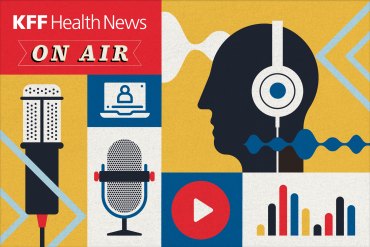Incluso los rivales políticos coinciden en que es urgente resolver el problema de la deuda médica
Desde 2021, en más de 20 estados se han promulgado nuevas leyes para frenar la facturación abusiva de los hospitales, ampliar la atención caritativa a los pacientes con ingresos más bajos y frenar a los recaudadores de deudas.
Trump Leads, and His Party Follows, on Vaccine Skepticism
Former President Donald Trump has presided over a landslide shift in Republican views on vaccines, reflected in false claims by candidates in election primaries, puzzling conspiracies from prominent conservatives, and a surge in anti-vaccine policies in statehouses.
Here’s Why Getting a Covid Shot During Pregnancy Is Important
New data from the CDC shows covid vaccination during pregnancy is key to protecting vulnerable newborns from the virus.
Trump lidera el escepticismo por las vacunas, y el partido lo sigue
Trump ha liderado un cambio radical en la visión de su partido sobre las vacunas, reflejado esta temporada de campaña en afirmaciones falsas de candidatos republicanos durante las primarias y en teorías conspirativas desconcertantes de voces conservadoras prominentes.
Doctors Urging Conference Boycotts Over Abortion Bans Face Uphill Battle
A famed breast cancer surgeon has created a California alternative to a major Texas event. Yet many doctors believe boycotting medical conferences in states that criminalize abortion accomplishes nothing and can be harmful.
Harris’ Emphasis on Maternal Health Care Is Paying Dividends With Black Women Voters
Polls are showing renewed support from Black women voters for the Democratic ticket. Vice President Kamala Harris has backed key health priorities for Black women.
In Chronic Pain, This Teenager ‘Could Barely Do Anything.’ Insurer Wouldn’t Cover Surgery.
An Alabama teen was told he needed surgery for debilitating hip pain. But his family’s insurer denied coverage for the procedure, which lacked a medical billing code. Expected to pay more than $7,000, his father charged it to credit cards.
Watch: What You Reveal, You Heal — Meeting the Makers of ‘Silence in Sikeston’
KFF Health News Midwest correspondent Cara Anthony sat down with WORLD executive producer Chris Hastings to discuss the origins of the “Silence in Sikeston” project, which explores the impact of a 1942 lynching and a 2020 police killing in the same rural Missouri community.
States’ Efforts To Alter Arcane Hospital Rules Mix Politics With Drama
Georgia is one of dozens of states that require health-care facilities to ask for permission to build or expand by obtaining “certificates of need.” Basically, state regulators get to decide whether a town needs a new hospital or long-term care center. If the need is deemed real, they’re granted a “CON.” The intent of the […]
The Public Health Consequences of Public Housing Failures
Every year more than 10,000 taxpayer-supported public housing units are lost to disrepair. But federal lawmakers routinely ignore the full amount, around $115 billion, needed to keep the units in “decent, safe and sanitary” condition. One-time funds for public housing repairs were cut from the final version of the 2022 Inflation Reduction Act to appeal […]
How North Carolina Made Its Hospitals Do Something About Medical Debt
State officials threatened to withhold public money from hospitals, pioneering a strategy that could become a national model.
She Was Accused of Murder After Losing Her Pregnancy. SC Woman Now Tells Her Story.
Amari Marsh, now 23, was a student at South Carolina State University when she lost her pregnancy in 2023. She was charged with murder and faced at least 20 years in prison. A grand jury cleared her in August. Now she’s sharing her story.
Florida’s New Covid Booster Guidance Is Straight-Up Misinformation
State Surgeon General Joseph Ladapo spread more anti-vaccine misinformation by telling Floridians to avoid mRNA vaccines. Vaccine experts and historians can’t remember another state health leader urging residents to avoid an FDA-approved vaccine.
Across North Carolina, Medical Debt Exacts a Heavy Toll
The state has among the highest levels of medical debt in the country, data shows.
Rural NC County Is Set To Reopen Its Shuttered Hospital With Help From a New Federal Program
One rural North Carolina county is on track to be among the first where a hospital reopens owing to a new federal hospital classification meant to help save small, struggling facilities.
Abortion Clinics — And Patients — Are on the Move, as State Laws Keep Shifting
Clinics in states where most abortions are legal, such as Kansas and Illinois, are reporting an influx of inquiries from patients hundreds of miles away — and are expanding in response. Despite the Supreme Court’s overturning of federal protections in 2022, abortions are now at their highest numbers in a decade.
These Alabama Workers Were Swamped by Medical Debt. Then Their Employer Stepped In.
A decades-old manufacturing company opened a clinic and made primary care and prescriptions free for employees and their families.
Arkansas’ Governor Says Medicaid Extension for New Moms Isn’t Needed
Federal law requires states to provide pregnancy-related Medicaid coverage through 60 days after delivery. Arkansas has not expanded what’s called postpartum Medicaid coverage, an option that gives poor women uninterrupted health insurance for a year after they give birth.
Tennessee Tries To Rein In Ballad’s Hospital Monopoly After Years of Problems
Ballad Health, a 20-hospital system with the nation’s largest state-sanctioned hospital monopoly, serves patients in Tennessee, Virginia, Kentucky, and North Carolina.
Journalists Explore Breast Cancer Rates and the Medical Response to Mass Shootings
KFF Health News and California Healthline journalists made the rounds on local and state media recently to discuss topical stories. Here’s a collection of their appearances.

























